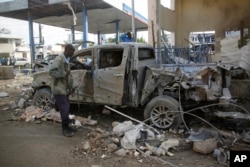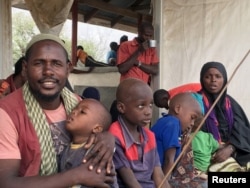The new U.S. envoy to Somalia, Stephen Schwartz, has been sworn into office, making him the first American ambassador to that nation in 25 years, and representing a landmark in U.S.-Somali relations.
U.S. Deputy Secretary of State Antony Blinken, who officiated the swearing-in ceremony, said Somalia has made significant strides in rebuilding its state in the past three years.
“It is precisely because this moment represents so much possibility, so much potential, that President Obama has chosen as his representative a diplomat of unmatched caliber and a public servant of unrivaled heart,” said Blinken.
State collapse is the main reason for the long U.S. diplomatic absence from Somalia. In 1991, the U.S. embassy in Mogadishu closed after Somalia’s military regime was overthrown and violence erupted between warring clan militias.
In late 1992, President George H.W. Bush deployed U.S. troops to Somalia, to support a U.N. aid mission aimed at relieving mass starvation. But 10 months later, 18 American soldiers were killed in Mogadishu by rebels who shot down two U.S. helicopters, in the “Black Hawk Down” incident. The United States withdrew its troops the next year.
After two decades of war and chaos, it was only in 2012 that Somalia achieved some measure of stability with the creation of an internationally-backed government.
But security remains a problem as the militant group al-Shabab continues to launch attacks in Mogadishu and elsewhere, a situation noted by the new envoy.
"It is time for Somali authorities to establish a responsive and effective Somali national army to defeat al-Shabab and unify the country,” said Schwartz.
Abdidahir Mohamed Sirad, a Kenyan businessman of Somali origin who now lives in Nairobi, believes security is key for Somalia and wants Schwartz to make it a priority.
“I think the United States needs to help with the military, building the Somali national forces, which can actually liberate that country from any group that is actually jeopardizing the peace in that country,” he said.
Elections scheduled for August represent a significant undertaking for Somalia, which is why some Somalis wish Schwartz could have been posted sooner.
“We wish he came a year before because right now, the elections are just a month away, about two, three months away, and we cannot do much as far as a lot of the logistics are concerned,” said Ali Abdullahi, a Nairobi-based management consultant.
Kenya’s announcement that it will close the Dadaab refugee camp, whose 300,000 residents are mostly Somalis, will be another issue among many for Schwartz.
“The road ahead, it is a very, very complicated one,” said Abdiwahab Sheikh Abdisamad, a Horn of Africa analyst. “But if he is smart enough, if he understands the dynamics of the region, if he understands the, what-you-call, the Somali communities, the culture and norms, he can easily overcome all those problems, and I wish him good luck.”
U.S. officials expect Schwartz will arrive in Mogadishu by the end of July.












